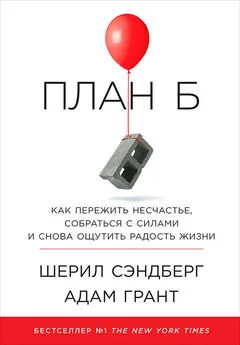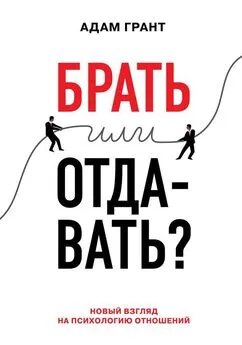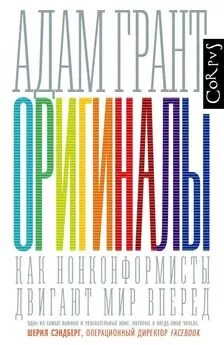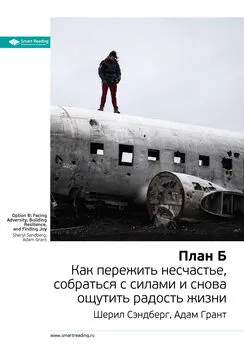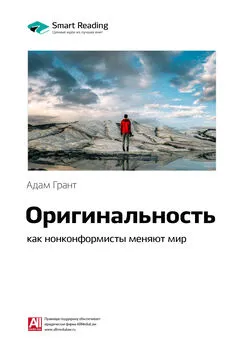Адам Грант - Подумайте еще раз. Сила знания о незнании
- Название:Подумайте еще раз. Сила знания о незнании
- Автор:
- Жанр:
- Издательство:Манн, Иванов и Фербер
- Год:2021
- Город:Москва
- ISBN:9785001698531
- Рейтинг:
- Избранное:Добавить в избранное
-
Отзывы:
-
Ваша оценка:
Адам Грант - Подумайте еще раз. Сила знания о незнании краткое содержание
Для всех, кто хочет научиться критически оценивать реальность и свои решения, переосмысливать и переучиваться, двигаясь вперед.
Подумайте еще раз. Сила знания о незнании - читать онлайн бесплатно ознакомительный отрывок
Интервал:
Закладка:
79
Mark L. Wolraich, David B. Wilson, and J. Wade White, «The Effect of Sugar on Behavior and Cognition in Children: A Meta-analysis», Journal of the American Medical Association 274 (1995): 1617–1621; see also Konstantinos Mantantzis et al., «Sugar Rush or Sugar Crash? A Meta-analysis of Carbohydrate Effects on Mood», Neuroscience & Biobehavioral Reviews 101 (2019): 45–67.
80
Oliver J. Sheldon, David Dunning, and Daniel R. Ames, «Emotionally Unskilled, Unaware, and Uninterested in Learning More: Reactions to Feedback about Deficits in Emotional Intelligence», Journal of Applied Psychology 99 (2014): 125–37.
81
Статистическая оценка эффекта Даннинга — Крюгера — пока спорный вопрос. Однако его существование никто не подвергает сомнению. Противоречия в основном касаются степени его выраженности и момента наступления [ Gilles E. Gignac and Marcin Zajenkowski, «The Dunning-Kruger Effect Is (Mostly) a Statistical Artefact: Valid Approaches to Testing the Hypothesis with Individual Differences Data», Intelligence 80 (2020): 101449; Tal Yarkoni, «What the Dunning-Kruger Effect Is and Isn’t», July 7, 2010, www.talyarkoni.org/blog/2010/07/07/what-the-dunning-kruger-effect-is-and-isnt. ]. Что интересно, даже при желании адекватно оценить себя сложнее всего наименее компетентным людям. После теста на логическое мышление участникам предлагали 100 долларов за то, что они угадают количество своих правильных ответов (то есть оценят себя скромно), но и тут все показали себя слишком самонадеянными [ Joyce Ehrlinger et al., «Why the Unskilled Are Unaware: Further Explorations of (Absent) Self-Insight among the Incompetent», Organizational Behavior and Human Decision Processes 105 (2008): 98–121. ]. В среднем участники насчитали на 1,42 больше правильных ответов (из двадцати), чем на самом деле, и наибольшее самомнение проявили те, у кого был наихудший результат.
82
Spencer Greenberg and Seth Stephens-Davidowitz, «You Are Not as Good at Kissing as You Think. But You Are Better at Dancing», New York Times, April 6, 2019, www.nytimes.com/2019/04/06/opinion/sunday/overconfidence-men-women.html.
83
Carmen Sanchez and David Dunning, «Overconfidence among Beginners: Is a Little Learning a Dangerous Thing?», Journal of Personality and Social Psychology 114 (2018): 10–28.
84
John Q. Young et al., «‘July Effect’: Impact of the Academic Year-End Changeover on Patient Outcomes», Annals of Internal Medicine 155 (2011): 309–15; Sarah Kliff, «The July Effect Is Real: New Doctors Really Do Make Hospitals More Dangerous», Vox, July 13, 2014, www.vox.com/2014/7/13/5893653/the-july-effect-is-real-new-doctors-really-do-make-hospitals-more.
85
Roger Boyes, Meltdown Iceland: Lessons on the World Financial Crisis from a Small Bankrupt Island (New York: Bloomsbury, 2009).
86
Boyes, Meltdown Iceland; «Cracks in the Crust», Economist, December 11, 2008, www.economist.com/briefing/2008/12/11/cracks-in-the-crust; Heather Farmbrough, «How Iceland’s Banking Collapse Created an Opportunity», Forbes, December 23, 2019, www.forbes.com/sites/heatherfarmbrough/2019/12/23/how-icelands-banking-collapse-created-an-opportunity/#72693f035e97; «25 People to Blame for the Financial Crisis», Time, February 10, 2009, content.time.com/time/specials/packages/article/0,28804,1877351_1877350_1877340,00.html; John L. Campbell and John A. Hall, The Paradox of Vulnerability: States, Nationalism & the Financial Crisis (Princeton, NJ: Princeton University Press, 2017); Robert H. Wade and Silla Sigurgeirsdottir, «Iceland’s Meltdown: The Rise and Fall of International Banking in the North Atlantic», Brazilian Journal of Political Economy 31 (2011): 684–97; Report of the Special Investigation Commission, April 12, 2010, www.rna.is/eldri-nefndir/addragandi-og-orsakir-falls-islensku-bankanna-2008/skyrsla-nefndarinnar/english; Daniel Chartier, The End of Iceland’s Innocence: The Image of Iceland in the Foreign Media during the Financial Crisis (Ottawa, ON: University of Ottawa Press, 2011); «Excerpts: Iceland’s Oddsson», Wall Street Journal, October 17, 2008, www.wsj.com/articles/SB122418335729241577; Geir H. Haarde, «Icelandic Leaders Accused of Negligence», Financial Times, April 12, 2010, www.ft.com/content/82bb2296-4637-11df-8769-00144feab49a; «Report on Iceland’s Banking Collapse Blasts Ex-Officials», Wall Street Journal, April 13, 2010, www.wsj.com/articles/SB10001424052702303828304575179722049591754.
87
Tim Urban, «The Thinking Ladder», Wait but Why (blog), September 27, 2019, waitbutwhy.com/2019/09/thinking-ladder.html.
88
Dov Eden, «Means Efficacy: External Sources of General and Specific Subjective Efficacy», in Work otivation in the Context of a Globalizing Economy, ed. Miriam Erez, Uwe Kleinbeck, and Henk Thierry (Mahwah, NJ: Erlbaum, 2001); Dov Eden et al., «Augmenting Means Efficacy to Boost Performance: Two Field Experiments», Journal of Management 36 (2008): 687–713.
89
Personal interview with Sara Blakely, September 12, 2019; see also Clare O’Connor, «How Sara Blakely of Spanx Turned $5,000 into $1 Billion», Forbes, March 26, 2012, www.forbes.com/global/2012/0326/billionaires-12-feature-united-states-spanx-sara-blakely-american-booty.html; «How Spanx Got Started», Inc., January 20, 2012, www.inc.com/sara-blakely/how-sara-blakley-started-spanx.html.
90
Tenelle Porter, «The Benefits of Admitting When You Don’t Know», Behavioral Scientist, April 30, 2018, behavioralscientist.org/the-benefits-of-admitting-when-you-dont-know.
91
Thomas Gatzka and Benedikt Hell, «Openness and PostSecondary Academic Performance: A Meta-analysis of Facet-, Aspect-, and Dimension-Level Correlations», Journal of Educational Psychology 110 (2018): 355–77.
92
Tenelle Porter et al., «Intellectual Humility Predicts Mastery Behaviors When Learning», Learning and Individual Differences 80 (2020): 101888.
93
Bradley P. Owens, Michael D. Johnson, and Terence R. Mitchell, «Expressed Humility in Organizations: Implications for Performance, Teams, and Leadership», Organization Science 24 (2013): 1517–38.
94
Mark R. Leary et al., «Cognitive and Interpersonal Features of Intellectual Humility», Personality and Social Psychology Bulletin 43 (2017): 793–813.
95
Samantha A. Deffler, Mark R. Leary, and Rick H. Hoyle, «Knowing What You Know: Intellectual Humility and Judgments of Recognition Memory», Personality and Individual Differences 96 (2016): 255–59.
96
Bradley P. Owens, Angela S. Wallace, and David A. Waldman, «Leader Narcissism and Follower Outcomes: The Counterbalancing Effect of Leader Humility», Journal of Applied Psychology 100 (2015): 1203–13; Hongyu Zhang et al., «CEO Humility, Narcissism and Firm Innovation: A Paradox Perspective on CEO Traits», Leadership Quarterly 28 (2017): 585–604.
97
Personal interview with Halla Tómasdóttir, February 27, 2019.
98
Jaruwan Sakulku, «The Impostor Phenomenon», International Journal of Behavioral Science 6 (2011): 75–97.
99
Dena M. Bravata et al., «Prevalence, Predictors, and Treatment of Impostor Syndrome: A Systematic Review», Journal of General Internal Medicine 35 (2020): 1252–75.
100
Basima Tewfik, «Workplace Impostor Thoughts: Theoretical Conceptualization, Construct Measurement, and Relationships with Work-Related Outcomes», Publicly Accessible Penn Dissertations (2019): 3603.
101
Реакция зависит от пола. В исследовании Басимы с участием специалистов по инвестированию сомнения в себе повышали производительность работы в равной степени среди мужчин и женщин, но мужчины активнее сотрудничали с коллегами. Коллективной деятельностью они компенсировали страх не оправдать ожидания. Женщины больше зависят от уверенности в себе и теряют боевой дух из-за сомнений.
102
Adam M. Grant and Amy Wrzesniewski, «I Won’t Let You Down … or Will I? Core Self-Evaluations, Other-Orientation, Anticipated Guilt and Gratitude, and Job Performance», Journal of Applied Psychology 95 (2010): 108–21.
103
See Christine L. Porath and Thomas S. Bateman, «Self-Regulation: From Goal Orientation to Job Performance», Journal of Applied Psychology 91 (2006): 185–92; Samir Nurmohamed, «The Underdog Effect: When Low Expectations Increase Performance», Academy of Management Journal (July 26, 2020), doi.org/10.5465/amj.2017.0181.
104
See Albert Bandura and Edwin A. Locke, «Negative Self-Efficacy and Goal Effects Revisited», Journal of Applied Psychology 88 (2003): 87–99.
105
Elizabeth J. Krumrei-Mancuso et al., «Links between Intellectual Humility and Acquiring Knowledge», Journal of Positive Psychology 15 (2020): 155–70.
106
Danielle V. Tussing, «Hesitant at the Helm: The Effectiveness-Emergence Paradox of Reluctance to Lead» (Ph.D. diss., University of Pennsylvania, 2018).
107
Edwin A. Locke and Gary P. Latham, «Building a Practically Useful Theory of Goal Setting and Task Motivation: A 35-Year Odyssey», American Psychologist 57 (2002): 705–17; M. Travis Maynard et al., «Modeling Time-Lagged Psychological Empowerment-Performance Relationships», Journal of Applied Psychology 99 (2014): 1244–53; Dana H. Lindsley, Daniel J. Brass, and James B. Thomas, «Efficacy-Performance Spirals: A Multilevel Perspective», Academy of Management Review 20 (1995): 645–78.
108
Frasier, season 2, episode 12, «Roz in the Doghouse», January 3, 1995, NBC.
109
Henry A. Murray, «Studies of Stressful Interpersonal Disputations», American Psychologist 18 (1963): 28–36.
110
Richard G. Adams, «Unabomber», The Atlantic, September 2000, «Letters», www.theatlantic.com/magazine/archive/2000/09/letters/378379.
111
Alston Chase, A Mind for Murder: The Education of the Unabomber and the Origins of Modern Terrorism (New York: W. W. Norton, 2004).
112
Murray S. Davis, «That’s Interesting!: Toward a Phenomenology of Sociology and a Sociology of Phenomenology», Philosophy of Social Science 1 (1971): 309–44.
Читать дальшеИнтервал:
Закладка:

